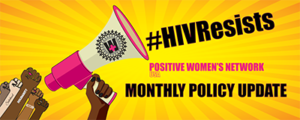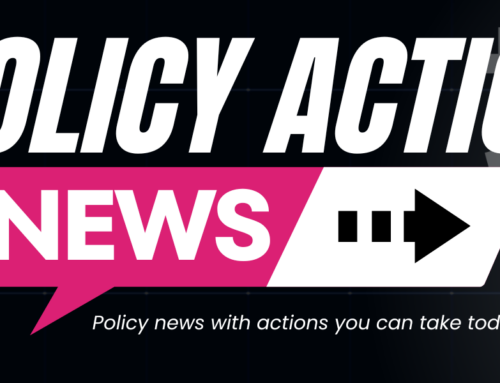
Was this email forwarded to you? Subscribe for bi-monthly emails from PWN in your inbox!
Reproductive Justice Teach-In: Join us on Sept. 8!
On June 24th, the U.S. Supreme Court eliminated the constitutional right to abortion. States across the U.S. have already begun to eliminate access to abortion and anti-choice lawmakers are pushing for the nationwide ban they’ve wanted all along. Are you outraged? Are you furious and ready to fight? Join PWN-USA for our Reproductive Justice Teach-in on September 8, 2022 at 4pm ET! We will be having a community discussion about what reproductive justice is, what it means for the HIV movement, and steps you can take for reproductive freedom. Register here.
Register Here |
🔥August’s Hot Topic🔥:
Let’s Talk about Monkeypox
The U.S. declared monkeypox (MPV), the disease caused by the monkeypox virus, a public health emergency on August 4. There are currently more than 16,000 total confirmed cases in the U.S. MPV is the latest failure of our fractured health care system and the federal government’s “wait and see” approach to pandemic response. Vaccines and medications are out of reach for most people because of governmental delay, inaction and miscommunication. Health departments are chronically under-funded, overwhelmed, and still reeling from the COVID-19 pandemic. Testing delays and muddled public health messaging have all contributed to the failure. So have institutional racism and homophobia.
First and foremost, anyone who has had close physical contact with someone with MPV can acquire the virus. Acquisition and transmission are not specifically limited to any gender, sexual orientation, or sexual behaviors. That said, CDC data shows that in the United States, Black and Latinx men who have sex with men are overwhelmingly impacted by MPV (and yet not surprisingly, white men have received the majority of MPV vaccinations). It is imperative to ensure resources are equitably directed towards communities most impacted, in this case Black and Latinx men who have sex with men, while combating the misinformation that suggests only gay men contract MPV. The public health response in the U.S. has failed to toe that line, instead opting for either silence or stigma.
We have seen the same problems and disparities repeat themselves in the HIV epidemic, COVID-19, and now, MPV. Our institutions (healthcare and beyond) were designed to put the same people in harms way: queer and trans folks – primarily Black, Indigenous and other people of color. And when systems don’t change, the results are repeated.
After criticism of their response to COVID-19 and MPV pandemics, the CDC has announced that it will make sweeping changes. The plans include emphasizing quicker response to public health issues, creating an equity office, addressing the problem of rapid turnover, fostering more collaboration with other agencies, and making public health messaging clearer and more accessible to the public. CDC Director Dr. Rochelle Walensky also plans to ask Congress for the power to require that all state health agencies and counties share their data with the CDC.
MPV and HIV: What you need to know. According to the National Institutes for Health, MPV does not appear to be more severe for people living with HIV who are virally suppressed. People with lowered immune systems may, however, be at risk for more severe illness and may not respond as well to the MPV vaccine. Antiviral treatments are available for people exposed to MPV or diagnosed with MPV. Vaccination is recommended for people exposed to MPV and those more likely to acquire MPV, including Black and Latinx men who have sex with men. Treatment and vaccination for MPV do not appear to negatively interact with HIV treatment or PrEP.
Other Updates
The “hot topic” (above) is a deeper dive into one of the most pressing policy-related issues each month for people living with HIV and our communities. But a lot happens each month! Below we list some other important updates relevant to PWN-USA’s intersectional policy agenda.
Access to Healthcare
- In a devastating blow to harm reduction advocates and people who use drugs, California Governor, Gavin Newsom, vetoed a bill that would have allowed three major cities (LA, San Francisco, and Oakland) to launch safe injection sites to help address the epidemic of fatal overdoses in the state.
- The Biden Administration announced plans to stop buying COVID vaccines, tests and treatments as early as this fall.
Reproductive Health Rights and Justice
- Trigger laws to restrict abortion access went into effect in three states last week. Indiana governor, Eric Hocomb, signed a new abortion ban into law, making it the first state to pass anti-abortion legislation post Dobbs. Other states, such as North Carolina (where a federal judge reinstated the state’s ban on abortion) and Texas (where a trigger law has taken effect making abortion a felony offense punishable by up to life in prison), are seeing pre-Dobbs abortion bans go into effect.
- All of the abortion clinics in Louisiana have had to close their doors or relocate to other states.
- Meanwhile, South Carolina’s Supreme Court has temporarily blocked enforcement of the state’s six week abortion ban and Kansas voted down a proposed constitutional amendment that said there is no right to an abortion.
- In Nebraska, a mother is facing felony charges for allegedly helping her teenage daughter through a medication abortion. Police sent a warrant to Facebook requesting access to private conversations between the mother and daughter, which were used to press criminal charges against the mother for her alleged role.
- A federal judge temporarily blocked Idaho from enforcing the state’s near-total abortion ban when the abortion is necessary for emergency medical care. The Department of Justice brought the lawsuit against Idaho, the first challenge brought by the administration since the Dobbs decision. The judge sided with the Biden administration, blocking part of that ban.
- Austin and other Texas public school districts are now offering menstrual products to students at no cost, joining 23 states that lifted taxes on menstrual products and 17 states requiring schools to give out these products to students at no cost, a great step toward menstrual equity!
- Religious beliefs continue to be used to prop up discriminatory practices. In Minnesota, a jury found that a pharmacist, who refused to provide a patient with emergency contraception because of “religious belief” did not violate the patient’s rights. Although the jury decided against the patient’s rights, it did say that the emotional damage caused by the refusal amounted to $25,000.
LGBTQ+ Health, Safety & Justice
- The Fourth Circuit Court of Appeals ruled that the Americans with Disabilities Act (ADA)
 covers people with gender dysphoria, the distress a person experiences because of a conflict between their gender identity and gender assigned at birth that can cause intense anxiety, depression, suicidal ideation and suicide. This is a huge victory for the rights and safety of trans people.
covers people with gender dysphoria, the distress a person experiences because of a conflict between their gender identity and gender assigned at birth that can cause intense anxiety, depression, suicidal ideation and suicide. This is a huge victory for the rights and safety of trans people. - In a major setback to trans liberation, Florida’s Board of Medicine, which oversees licensing health care professionals, voted to start the process of 1) banning gender-affirming care for trans youth and 2) implementing a 24-hour waiting period for transgender adults seeking hormone therapy or gender-affirming surgery.
- Pennsylvania Governor, Tom Wolf, signed an executive order to protect LGBTQ youth by banning conversion therapy, the traumatic and widely discredited practice that aims to “convert” LGBTQ+ people to heterosexuality.
Ending Criminalization
- In Tennessee, legislators have placed unhoused people in harms way by making pitching a tent on public land outside of designated campsites a felony offense. Several other states have similar legislation currently under consideration, including Arizona and Georgia.
Economic Justice
- President Biden signed the Inflation Reduction Act into law, which will allow Medicare to negotiate lower prices for some prescription drugs starting in 2026, reduce the cost of healthcare, increase taxes on the wealthy and help address the climate crisis.
- President Biden announced plans to cancel some student loans and extend the student loan repayment pause until December 31. The amount of debt canceled depends on how much money the borrower makes and the type of loans they have. While this is a major step forward, the policy change is not bold enough to make a dent in the Black student debt crisis.
Ending Violence
- The Biden Administration has successfully put an end to Trump-Era’s “Remain in Mexico” Policy which required migrants to wait in Mexico for their asylum hearings.
- A federal judge temporarily blocked part of Florida governor DeSantis’ “Stop WOKE” act,
 which restricts how people in businesses and schools can discuss race, racism and white supremacy, on the grounds that it violates the First Amendment.
which restricts how people in businesses and schools can discuss race, racism and white supremacy, on the grounds that it violates the First Amendment.




